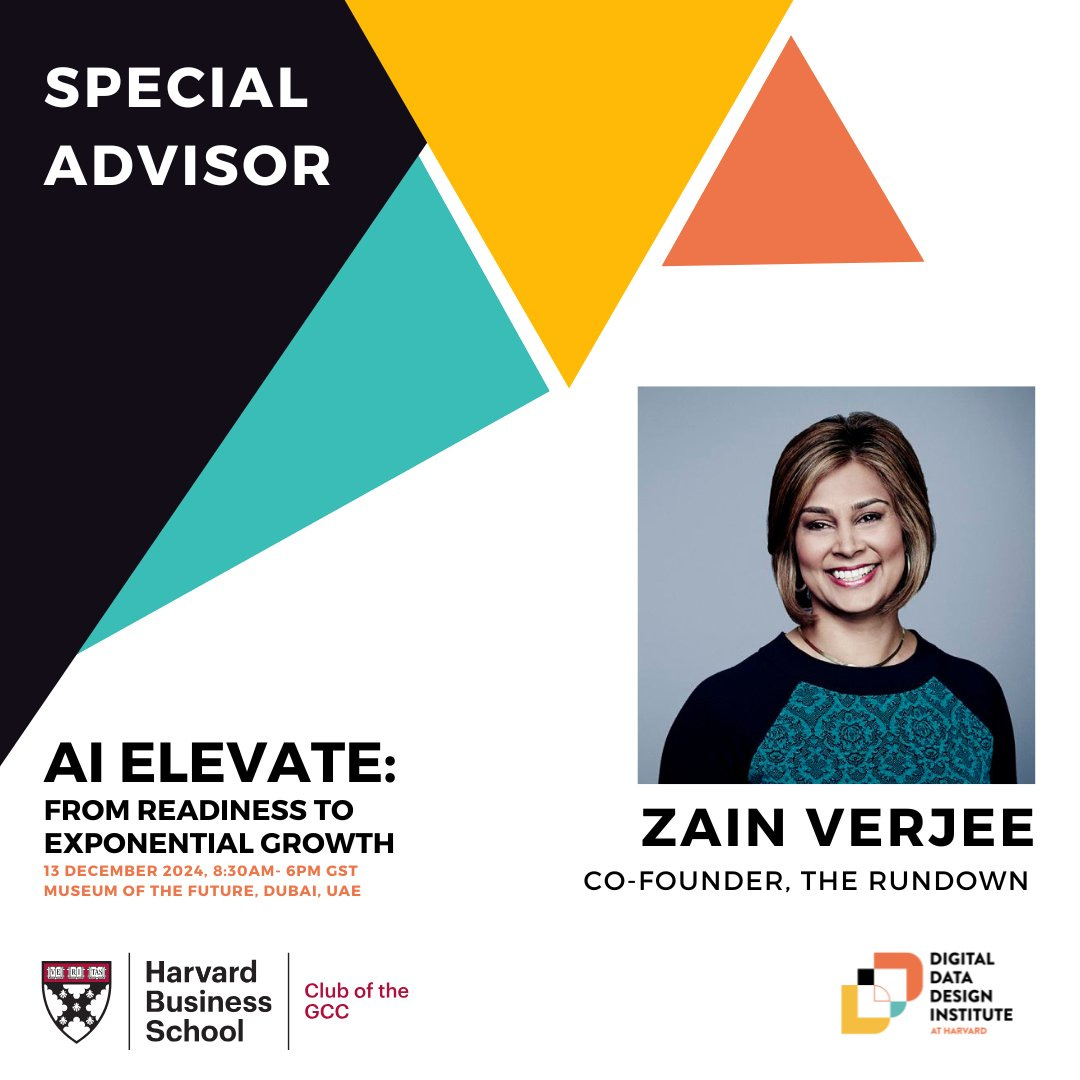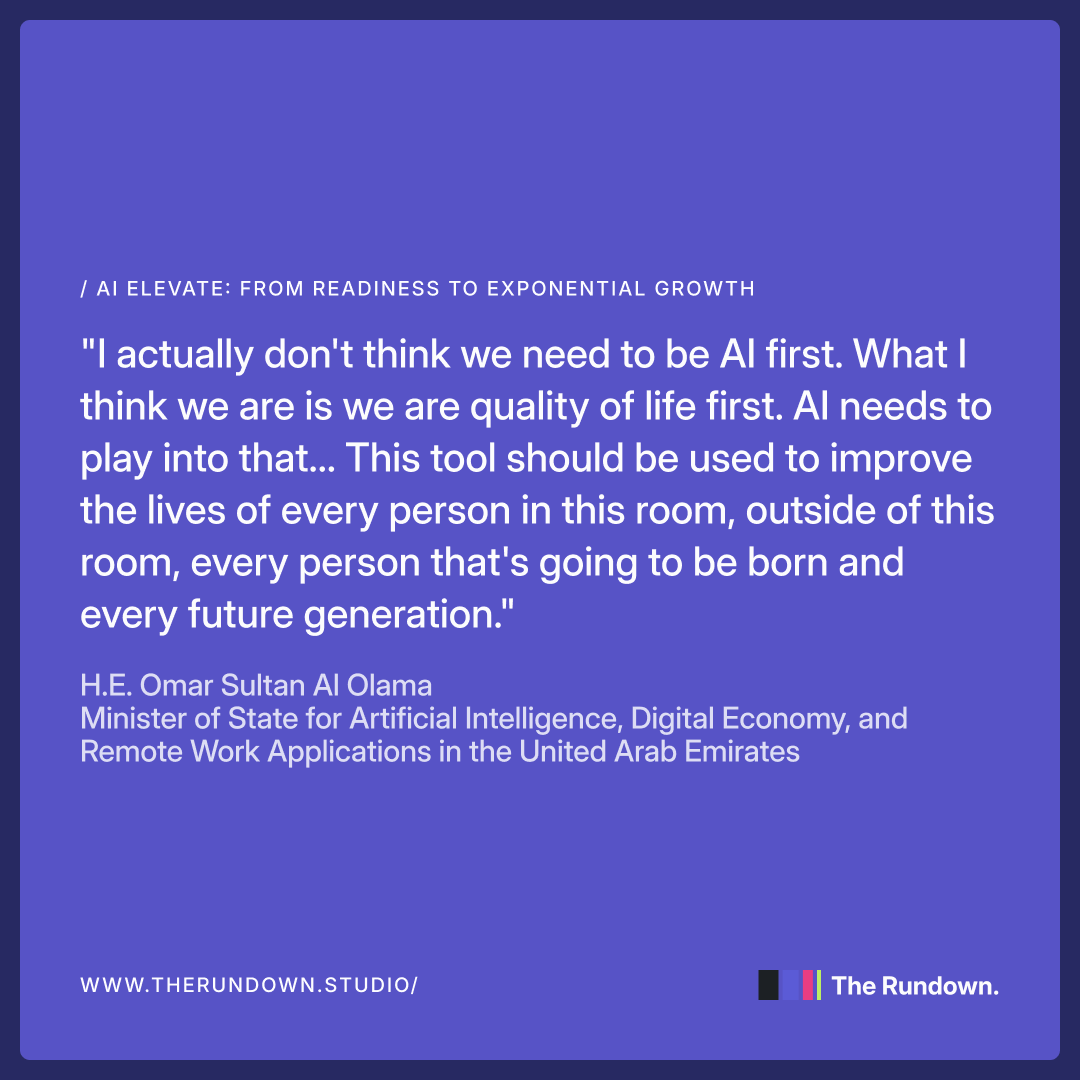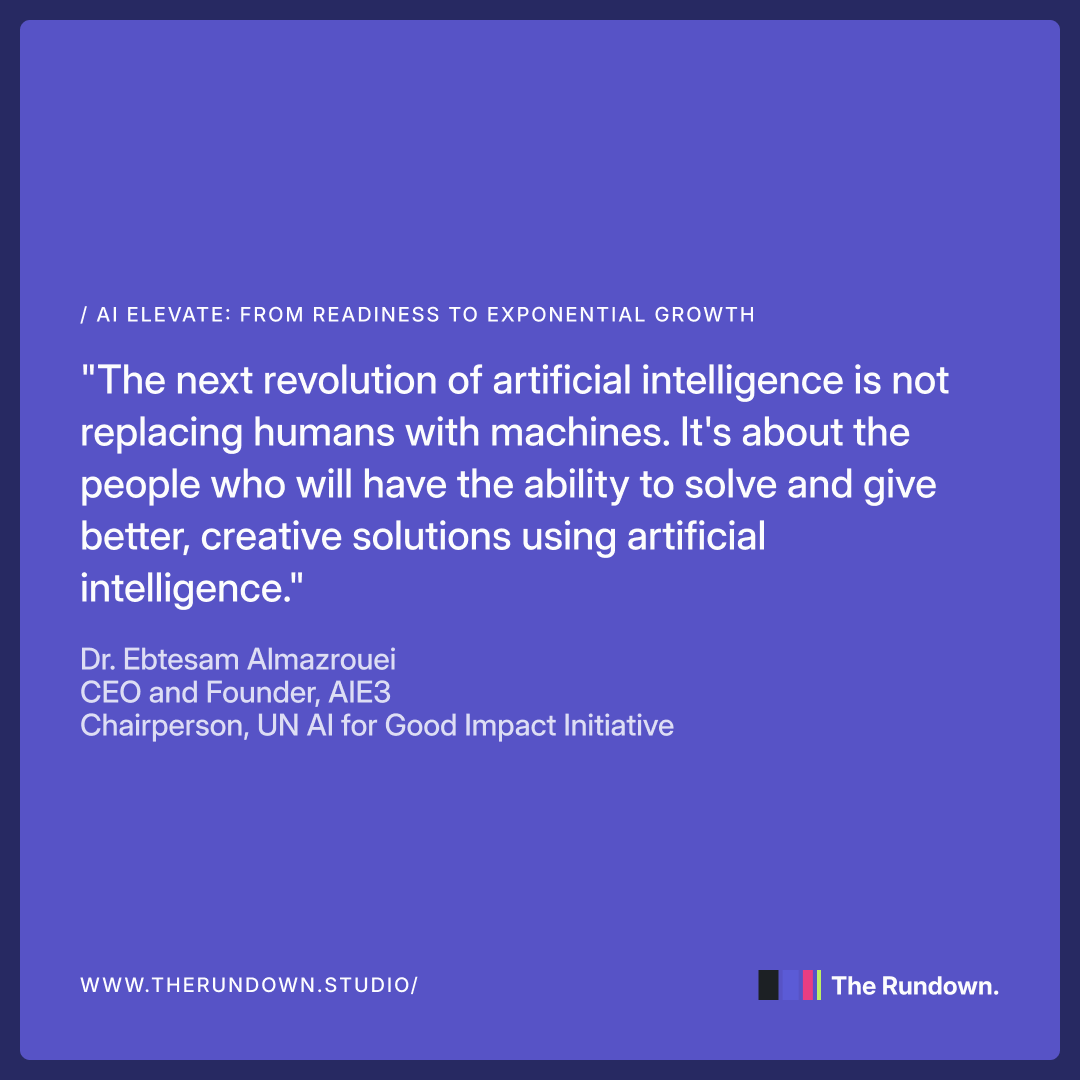AI Elevate: Inside Harvard's Dubai Summit
The Digital Data and Design Institute at Harvard hosted a fantastic gathering in Dubai where global leaders reimagined our technological future.
I’ve had a whirlwind week, around the world. The highlight was the Digital Data and Design Institute at Harvard’s inaugural AI Elevate gathering in Dubai. I’ll share video of the sessions with you as I receive them. It was so great to catch up with friends and family in Dubai !
As a D Cubed Fellow, attached to the ‘Tech For All” lab, I had the privilage of hosting the day long event at the Museum of the Future. What struck me most was how far beyond the usual AI headlines the discussions went – focusing instead on practical implementation, real results, and human impact.
Rehearsal
Why AI Changes Everything
Founder of the Institute, Professor Karim Lakhani opened with a great analogy about AI adoption. "Computers are the bicycle for the mind," he noted, "but now all of us in our 60s and our 50s and our 40s and our 30s and our 20s and our teenagers need to learn how to ride this bike when we're adults."
The data he shared was eye-opening:
Companies are seeing 30-99% improvement in efficiency with AI tools
75% of global knowledge workers already using AI daily
Leadership engagement crucial for successful implementation
For those societies that push back, that ignore, that want to delay, they will suffer more than those that embrace and adopt responsibly.
30% rule
Professor Tsedal Neeley, Naylor Fitzhugh Professor at Harvard Business School, offered practical insights about what it actually takes to transform organizations in the AI era. Her concept of the "digital mindset" resonated with me.
I liked her "30% rule" – you only need to understand about 30% of tech/AI concepts to effectively contribute, similar to language learning. This insight immediately made AI feel more approachable for many in the room.
She says you don't need to become a technical expert. "You don't need to be a programmer, you don't need to be a data scientist. All you need is what we coined, the 30% rule, which is the minimum level of threshold that you need in understanding change capabilities in understanding technology.”
Learning to learn is the superpower of today, because things are changing so fast
The real-world impact she shared was compelling:
Moderna's AI-driven success (operating with 800 vs traditional 100,000 employees)
Rakuten's "Triple 20" strategy achieving 77% decrease in marketing costs
Programmers showing 55.8% faster coding and 75% higher job satisfaction with AI
Custom bots reducing analysis time from months to minutes
But maybe her most crucial insight addressed why 70% of transformations fail: "The biggest drivers of success is when the technology architecture and org structure are fully aligned. AI stumbles at the front lines. It's the people who do the work that implement AI. So if they're not trained in AI or change, it's not going to work."
Innovation Without Borders
Professor Rembrand Koning from Harvard Business School presented one of the most interesting real-world experiments in AI application I've seen. His team provided hundreds of Kenyan entrepreneurs with access to an AI business advisor through WhatsApp, built on GPT-4. The results challenged everything we think we know about AI adoption in emerging markets.
"Though we have 600 million entrepreneurs, which is fantastic, I think we need more," he began. "We know that there's hundreds of millions of entrepreneurs that can't start or grow." The barriers are familiar - limited access to funding, difficulty finding technical talent, and lack of quality mentorship.
The experiment's results were striking:
Successful entrepreneurs increased their profits by 15% when using the AI tool
However, struggling entrepreneurs saw an 8% decline when using the same AI advice
The team spent 4 months on prompt engineering to make the system effective
The initiative is now scaling to millions of entrepreneurs in Southeast Asia
But here's what I found most revealing: "Like a human mentor, the AI requires context," Koning explained. "The entrepreneurs who were already doing well, they were able to tailor the AI to their business needs. Those who were struggling really couldn't get the AI to understand the context and needs of their business."
This reveals a crucial insight about AI adoption - it's not just about access to technology. Success depends on the user's ability to contextualize and apply AI's insights to their specific situation. As Koning put it, "Suddenly you can get an AI engineer. Suddenly you can get helpful advice from an AI agent. And maybe you can't do it alone, but with an AI you could build a new business that couldn't exist otherwise."
The implications for emerging markets are profound:
AI could democratize access to business expertise
Success requires training in how to effectively use AI tools
The technology could help bridge the global mentorship gap
But support systems are crucial for struggling entrepreneurs
What excites me most about this research is how it points to a future where geography doesn't limit access to expertise. But it also warns us that we need to think carefully about how we implement AI solutions in emerging markets. Simply providing access isn't enough - we need to build the capacity to use these tools effectively.
UAE's Vision: Quality of Life First
One of the most compelling sessions featured His Excellency Omar Sultan Al Olama, UAE's Minister of State for Artificial Intelligence. His perspective challenged conventional thinking about AI implementation.
This human-centric approach has had great results. The UAE has implemented 147 different AI applications in government services, but what's fascinating is how they've done it. Rather than showcasing AI for its own sake, they've focused on making it invisible – creating seamless experiences that enhance daily life without drawing attention to the technology.
A good example he shared was airport processing. Instead of promoting "AI-powered gates," they've created frictionless experiences where travelers might not even notice the technology working in the background. The result? Efficient processing of 89 million travelers without compromising the human experience.
The numbers tell an impressive story:
377 senior government officials trained through Oxford partnership
2.1 million people participated in AI prompting education
5-25% infrastructure cost savings
Ranked 5th globally in AI governance (Stanford)
But perhaps his most powerful insight came from history. He referenced the Middle East's 1515 decision to ban the printing press – a choice that led to 180 years of declined innovation while Europe experienced its Renaissance. "A ignorance-based decision to ban something you don't understand is going to lead to you going backwards many, many years," he warned. This historical lesson shapes UAE's current approach: embracing AI thoughtfully while ensuring it serves human needs first.
The Deep Enterprise: Amazon's Revolutionary Journey
Devesh Mishra, President and Chief Product and Technology Officer, CoreAI Keystone, and ex-VP at Amazon, shared a transformation story that put the power and adoption of AI into perspective. "Before I left Amazon, almost 99.9% of the things we were buying from our vendors, which was about $200 billion worth of items, was bought without any human touch."
The journey he outlined was remarkable:
2009: $25B company running on Excel sheets
2021: Managing 200M+ items across 50 businesses in 12 countries
Achievement: 99.9% automated purchasing worth $200B
Daily Impact: $600M in AI-driven decisions
But perhaps his most valuable insight was about team structure. "Most companies fail in how they design their AI because they're not creating a flywheel of humans and machines, but humans versus machines." The solution? Organizing teams in triads: AI engineers, scientists, and product managers working together.
Microsoft's Warning: The New Competitive Reality
Bobby Yerramilli-Rao, Microsoft's Chief Strategy Officer, delivered some really crucial insights. "Now we're entering an era where actually you with AI are going to beat the competitor which doesn't have AI, but the thing that you have to stay ahead of is AI, because whatever you're good at... at some point, the AI might become just as good as you."
The transformation he outlined is already happening:
Software development showing 55-60% productivity gains
Japan's current shortage of 1 million developers being bridged by AI
Every individual becoming effectively a "team" through AI agent assistance
Complete product development possible in 90 minutes
His most striking example was Focus Fuel – a 3-person team achieving millions in revenue using AI to compete with established CPG brands. This isn't theoretical anymore; it's happening now.
Nissan's AI Revolution: Unlearning to Learn
Robert Farmer, Nissan's Chief Market Intelligence Officer, shared a perspective that we all need to keep in mind when it comes to AI implementation.
I thought that AI adoption in market research would add to all the tools and tricks that I've developed over my career. But actually what I learned is no - you have to unlearn everything.
The transformation he described was remarkable:
Traditional process: 60 months from concept to market
Thousands of customer surveys and diaries
18 months just for initial concept
4-6 months of market research
The game-changing moment came when market preferences suddenly shifted from EVs to hybrids:
Old approach would require 3-4 months of new research
With AI, they pivoted the entire project in 24 hours
Maintained all insights while adapting to new vehicle type
"When we switched from EV to hybrid, I thought 'Oh no, we have to start over.' But my team came back in 24 hours saying 'The platform transfers. The AI doesn't care what segment you're in - it has everything.' This was the greatest transformation I've seen in my career."
AI for Good: Global Impact at Scale
Dr. Ebtesam Almazrouei, Chair of the UN AI for Good Impact Initiative, brought the conversation back to what matters most – human impact. The numbers she shared were staggering:
$15.7 trillion potential contribution to global GDP by 2030
$2.2-4.6 trillion needed annually for sustainable development goals
40% potential reduction in emissions through AI applications
It was her practical examples that really drove the point home. From enabling mobility for disabled patients to revolutionizing healthcare access in remote areas, she demonstrated how AI is already transforming lives.
Reimagining Public Services: Dubai's Digital Revolution
The session featuring Dubai's transformation brought theory into practice. H.E. Younus Al Nasser from Dubai Data & Statistics Establishment shared impressive metrics:
100 billion Dirham expected economic impact
Integration of public, private sectors and citizens
Evolution from electronic → smart → AI-enabled services
Focus on predicting rather than just responding to citizen needs
What caught my attention was their approach to implementation – focusing on seamless integration rather than visible technology. Airport smart gates evolved through five iterations to achieve completely barrier-free passage, demonstrating their commitment to continuous improvement.
What This Means For All of Us
Hosting this conference made one thing clear – AI isn't just another technology wave; it's a fundamental reshaping of how we work, live, and create value. The key takeaways for anyone navigating this transformation:
Speed matters: The window for adoption is shorter than previous technological revolutions
Quality of life must drive implementation, not technology for its own sake
Success requires "unlearning" as much as learning
Team structure and organization matter as much as the technology itself
The future belongs to those who can effectively combine human and AI capabilities
Looking Ahead
This conference reinforced what we've been building at The Rundown Studio – the need for practical, accessible guidance in navigating the AI revolution. Whether you're a business leader, policy maker, or professional looking to stay ahead, understanding these transformations is crucial.
Your support through paid subscriptions helps us continue bringing you this kind of in-depth coverage and analysis.
Transparency Note
We used OtterAI to record the live event, and Otter summarized the sessions.
We used ClaudeAI to help edit and refine our takeaweays
We used a human to select the best quotes
A human proof read this substack










